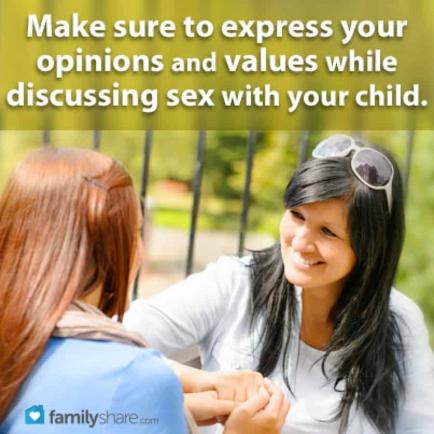
Somewhere between the ages of 9 and 12, many parents have the initial "birds and bees" talk with their child. The "talk"� is often one that is dreaded, but it provides the foundation of many meaningful exchanges with your child as they navigate the difficulties of adolescence. Remember that this is your chance not only to give your child the proper information about the reproductive systems, but a basis for you to give your child your views on sex, specifically sexual activity before marriage. Talking openly about sex with your teen will be one of the most meaningful conversations you will have.
Teenagers are bombarded with images and messages about sex from their friends and the media. These messages may give them incorrect information or may not agree with the attitudes or values that you want your teen to adopt about a normal and healthy sexual relationship.
It is no secret that the hormonal changes that occur beginning at puberty and continuing throughout adolescence trigger changes in your teen's body, mind and emotions as they try to make sense of the world and their newly found sexuality. Teens, being curious are likely to experiment with sex. They do not have the experience to understand the changes that come into a relationship that are brought on by increased sexual contact. Peers may be experimenting with sex, or even bragging about sexual encounters that are exaggerated or false and your teen may feel pressure to "say yes"� or risk losing their boyfriend/girlfriend.
- Always speak openly about the body and give the proper anatomical terms. Make it clear to your child that they can trust you with their questions and concerns.
- Educating your child about sex is not just having "the talk". This process must be an ongoing conversation since your child's questions will evolve from, "Where do babies come from?"� to "What if I say no? Will he leave me?"�
- Build your child's self image and self esteem since having a low self image and self esteem is a risk factor for early sexual experimentation as a teen tries to find acceptance.
- Make sure to express your opinions and values while discussing sex with your child. This does not have to be a lecture, but your child can learn why you feel the way that you do.
- Talk to your children about the consequences of sex - pregnancy, sexually transmitted diseases (make sure to learn about HPV, the biggest risk as an STD currently), and the emotional changes that occur after having sex.
- Discuss contraception - emphasizing that abstinence is the only 100% fail proof form of birth control.
- Make sure that your child knows their decision to lose their virginity is their own and they need to make it independently, without the pressure of their peers or the person with whom they are involved.
- Practice with your teen different ways to express their feelings when confronted with sexual situations. Give them the opportunity to express themselves with their own words. If they know how they will respond in a situation ahead of time, they are more confident when they need to call on those words. Not discussing, or giving them the tools they need makes it more likely they will feel pressured to have sex before they are ready.
- Make sure the conversations you have with your teen about sex are two-way. If they feel that you are lecturing them and not open to their feelings, thoughts and opinions, they are less likely to come to you.
- Make your feelings about sex known, rather than turn sex into a taboo. It is perfectly acceptable to say something similar to your teen, "Sex is a wonderful experience, especially when you are able to be in a mutually committed relationship."�

